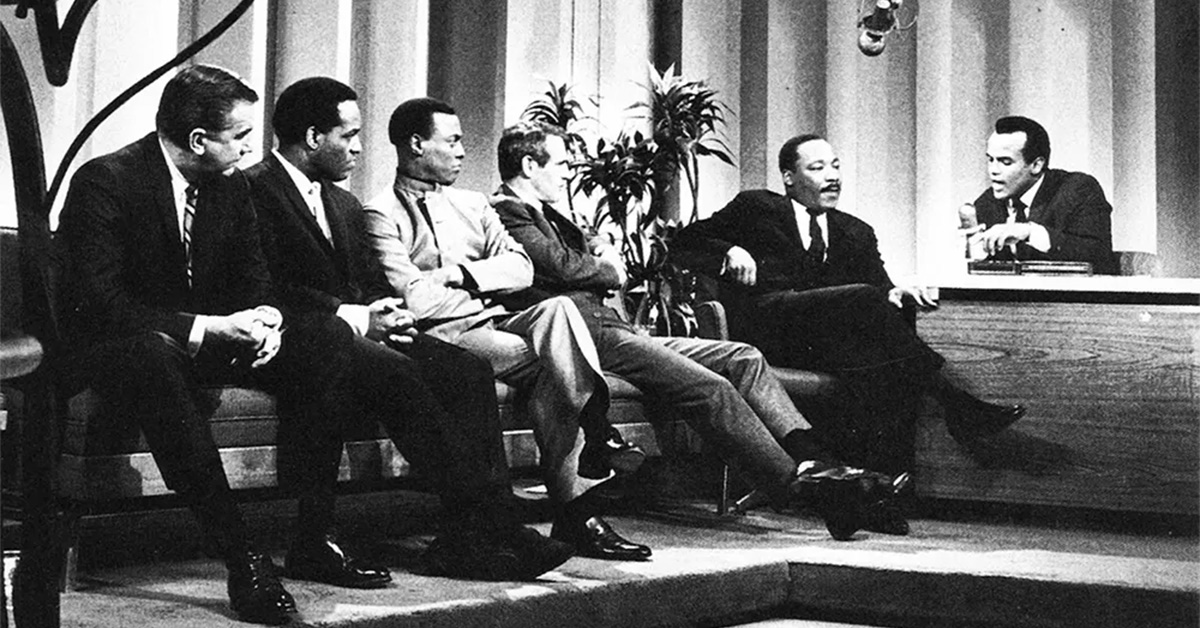The 1965 March on Washington was a galvanizing moment for the American civil-rights movement of the ‘60s, but in terms of media coverage of American race relations of that era, it happened in the middle of almost daily news reports, public interest programming and lively — sometimes incendiary — radio and television interviews and discussions.
The Feb. 18, 1965, debate between acclaimed novelist James Baldwin and noted magazine editor/pundit William F. Buckley was especially significant because it featured two articulate speakers addressing centuries-old problems and the challenges to a solution — it’s the history of the civil-rights struggle distilled to a one-hour, one-on-one exchange.
The Cambridge Union Society, observing its 150th anniversary, invited Baldwin and Buckley to debate “Has the American Dream Been Achieved at the Expense of the American Negro?”
The result is significant because of its historic interest, but even more so because it’s so alarmingly contemporary. March On will re-create this historic debate Sept. 20.
Speaking first, Baldwin expressed the shock of growing up Black in America and finding the country to which you pledge allegiance has no allegiance to you.
Living in Paris, Baldwin said Americans treat Europeans the same way they treat Blacks: “With bland ignorance, condescension, always being charming and cheerful.” He added, as a Black man, “I’m one of the people who built the country. I picked the cotton, I carried it to the market, and I built the railroads under someone else’s whip for nothing. For nothing.” He said Blacks are trying to form a new identity, “for which we need each other.”
Buckley countered Baldwin’s statements with techniques that are familiar to anyone following the news in 2020.
With alarm based on nothing tangible, he stated that Baldwin “threatens America with a necessity to jettison our entire civilization.” He also implied that Blacks are not ready for equality (“The question is not that they can vote, but that they be prepared to vote”). And he turned Caucasians into victims, saying Black people “seem to be less concerned with the advancement of Negroes than in the regression of white people.”
The debate took on significance in its timing: Just a few days later, Malcolm X was assassinated, and “Bloody Sunday,” the Montgomery to Selma march, occurred three weeks later, on March 7.
Hollywood has always been filled with activists, but they shifted into high gear at that point, and Variety recorded every step of the way.
On March 15, 1965, Variety ran the headline “Urge Stars ‘Fall on Alabama.’” The story said Hollywood wanted to help the cause. A committee called Hope for Selma was formed under chairman Steve Allen to create a telethon-like TV special that would discuss key issues and raise funds for legislation. Allen’s group got commitments from Harry Belafonte, Marlon Brando, Sammy Davis Jr., Burt Lancaster and Carl Reiner, among others.
Meanwhile, the media made the civil-rights struggles pervasive. As Variety wrote, “Hardly a day or a newscast has gone by that hasn’t put a major accent, through word and picture, on the integration story and the Negro on the march.” The extensive coverage was especially impressive because there were only three networks carrying news, and they had to deal with, as Variety wrote, “the frightened little people of Madison Avenue.”
While civil-rights coverage was extensive in the U.S., the whole world was watching. As Variety reported, Canada’s CBC radio scheduled an interview with civil-rights leader Malcolm X on May 6, 1964; followed the next night with Alabama Gov. George Wallace; and on May 8, with comedian-activist Dick Gregory.
In the 1965 debate, Baldwin said that a turning point for Blacks was World War II. “Africa was suddenly on the stage of the world, and Africans had to be dealt with, as never before. This gave an American Negro a sense of himself beyond a savage or a clown.”
In addition, many Blacks — similar to Latin/Hispanics, Asian Americans and other racial minorities — risked their lives in World War II, but returned to the U.S. and discovered they were facing the same level of bigotry as before.
That realization renewed the demands for equality. Once again, showbiz was a measure of the struggle.
Decades before #OscarsSoWhite, in 1956, attorney and future Supreme Court justice Thurgood Marshall wrote a letter to Variety commending the articles that advocated more roles for Blacks in Hollywood; it was just one example of the attempts at change, with Sidney Poitier setting an example by only playing roles that offered positive images.
After simmering in the 1950s, the fight for equality exploded in the 1960s.
On the day after the Aug. 28, 1963, March in Washington for Jobs & Freedom, Variety reported that more than 200,000 attendees heard the Rev. Dr. Martin Luther King Jr.’s historic “I Have a Dream” speech.
The paper covered the event extensively, listing such other speakers as Belafonte, Ossie Davis and Ruby Dee. Singers included Joan Baez, Bob Dylan, Mahalia Jackson, Odetta and Peter Paul & Mary; among the attendees were Poitier, Sammy Davis Jr., Lorraine Hansberry, Charlton Heston, Rita Moreno, Paul Newman, Gregory Peck and Sam Peckinpah.
As Variety reported, nitery star Josephine Baker, who’d vowed never to return to the U.S., made an exception and flew in from Paris, exclaiming, “This is the happiest day of my life.”
As a side note: Historic moments can inspire millions — or they can inspire people to cash in. According to Variety, a Federal Court ruled that the “I Have a Dream” speech was the property of the speaker and not in public domain. That ruling halted several record labels’ unauthorized albums of the speech. Rev. King sued the record labels claiming that these albums “diverted funds from the civil-rights movement.”
But not everyone was greedy. The 1960s provided many rich moments in U.S. history — and broadcasting history.
That history included late-night talk show “Open End,” with David Susskind, which on June 6, 1963, broadcast a 100-minute interview with Dr. King.
On Aug. 28, 1963, the same day as the March, Variety reviewed a 50-minute BBC documentary called “The 100-Year Promise,” which was notable for focusing on Black voices.
The show’s climax was Baldwin, “searching to express the dilemma of his people” and stating “that the future of the Negro was the future of America.”
A week later, NBC preempted its regular primetime shows on Sept. 2 to air the three-hour “The American Revolution of ’63,” anchored by Frank McGee. Variety described it as “the definitive portrayal of the momentous civil rights issue.”
The news special recapped years of struggles, such as lunch-counter sit-ins, Freedom Riders and peaceful protests as well as violence in various cities across America. It also showed “Mississippi Governor Barnett’s scathing attack on TV as the real culprit in the whole issue,” according to the story.
The Civil Rights Act was passed on July 2, 1964. Immediately after that, Variety reported that in New Orleans, “Negroes testing the new Federal Civil Rights law Monday … found doors opened at previously all-white downtown and nabe theatres, drive-ins, restaurants and hotels … There were no major incidents reported since the legislation barring discrimination in public accommodations went into effect Thursday night.”
It was considered a victory that Americans could attend public venues on an equal footing, without incident. This was the world that Baldwin was talking about.
Despite Barnett’s criticism, TV news often rose to the occasion, offering serious fare in primetime. There was live coverage of the Montgomery-to-Selma march in 1965. Emmy nominees that year included NBC’s study of U.S. foreign policy, NBC’s Senate hearings on Vietnam, CBS’ study of the Ku Klux Klan and National Educational Television’s multi-part “History of the Negro People.”
But TV coverage wasn’t all sunny.
On Aug. 4, 1965, Variety covered a three-day seminar at Brandeis. One of the speakers mentioned a Jackson, Miss., station that “had never in its entire time on the air made the slightest effort to obtain or present the Negro point of view.” The station only carried that viewpoint when the FCC threatened to revoke its license.
On Jan. 3, 1968, FCC commissioner Nicholas Johnson wrote a front-page guest column in Variety. He began by asking broadcasters, “What are you doing to encourage communication between the blacks and whites of your community?” He acknowledged it was not an original question, but worth repeating, saying the 1967 Detroit uprisings helped point out that the news media had little inkling of the extremes of poverty, suffering and outrage “festering in the ghettos.”
Johnson saluted TV news for enlightening the public about early-1960s problems in the Deep South. But when unrest spread north, such as in Detroit, “the challenge was close to home” and reporting facts “too disturbing for the local press to report or even notice.” He repeated the point about the urgent need for genuine exchanges. “It’s not enough to report the Negro as ‘news’ — as a ‘disturbance, as a ‘problem.’ The media needs to let blacks speak for themselves, not just through the filter of a responsible ‘spokesman’ or reporter.”
And the smiling condescension that Baldwin had addressed was prevalent.
0n February 1968, Variety ran a story about Belafonte’s week-long run as guest host on “Tonight Show.” A Black guest host was a rarity and Belafonte said it was a “groovy experience.” Inevitably, some viewer mail protested that he was using the show to promote his ideas on civil rights and anti-war stance.
A year later, comic Flip Wilson was guest host and he took a swig of Vicks cough medicine, a sponsor. Variety noted that somehow civilization survived, but “there was a time when Negro guests hosts on ‘Tonight’ weren’t allowed to handle the products. The camera would cut to announcer Ed McMahon for the product presentation.”
Back at the 1965 debate, student David Heycock introduced both speakers and cited the recent problems of voter suppression in the South, with Dr. King among those arrested for trying to battle the system to prevent voter registration.
As Baldwin said at Cambridge, “We talk about integration as if it’s some great new conundrum. Isn’t 400 years enough? How is it a question now?”
Those were valid points then and remain valid today.
Read More About:
Read the source article: CLICK HERE




